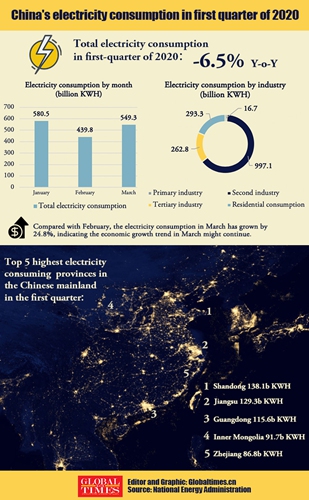China’s electricity consumption slumps 6.5% in Q1
Source:Global Times Published: 2020/4/20 13:18:40

Information Graphic: Globaltimes.cn
China's electricity consumption - a barometer of the country's economy - slumped 4.2 percent in March, moderating 5.9 percentage points from a steeper slide in February as China's economy began a robust recovery, according to data released by the National Development and Reform Commission (NDRC), China's economic planner, on Monday.China's social electricity consumption dived 6.5 percent year-on-year in the first quarter, with consumption in the secondary industry and services sector down 8.8 percent and 8.3 percent, respectively, NDRC data showed.
The downward streak was in line with China's first-quarter GDP, which contracted 6.8 percent year-on-year, its first decline since 1992 when China started publishing quarterly economic data. Economic activities gradually rebounded in March.
NDRC official Yan Pengcheng said at a press briefing on Monday that China's 6.8 percent GDP contraction in the first quarter was the result of a sudden emergency rather than a mirror of its economic fundamentals, and such a contraction cannot be examined in a historical context.
"The pandemic has grounded economies in many countries and halted global trade. Economic activities amid the pandemic cannot be compared with those of normal times," Yan said, noting that economic order is gradually being restored in China as the COVID-19 situation has been put under control.
Yan stressed that it is unavoidable for China to pay a price for its epidemic prevention measures. "But life is priceless, and the short-term economic pressure is a cost we must weather and a cost worth paying."

Employees work at Dongfeng Motor Corp assembly line in the economic and technological development zone of Urumqi, capital of Northwest China’s Xinjiang Uyghur Autonomous Region, on Monday. The firm plans to expand sales channels along the routes of the Belt and Road initiative in 2019 and promote gas-fired traction vehicles in Central and Western Asian markets. The economic zone plays a vital role in driving local real economic growth, generating 47.6 billion yuan ($6.96 billion) in GDP and 15.5 billion yuan in fiscal revenue in 2018. Photo: VCG
As the pandemic cripples major economies and batters demand overseas, the NDRC vowed that Chinese policymakers would come up with measures to expand demand at home, in particular to boost large purchases such as cars and home appliances.
In terms of foreign trade, the NDRC has also encouraged foreign companies to ship products via China-Europe freight trains, according to NDRC spokesperson Yuan Da.
China has shipped roughly 448,000 units and 1,440 tons of gears which are vital for virus prevention to European countries including Italy and Spain via China-Europe freight trains, Yuan said. As of the end of March, a total of 1,941 China-Europe freight train journeys had been made, transporting 174,000 20-foot equivalent units, up 18 percent year-on-year.
In response to media reports that some countries including Japan and the US are considering measures to encourage foreign firms return to their home countries, Yuan said that foreign investment in China remains basically stable despite the COVID-19 assault.
"Now, foreign companies' businesses in China are gradually getting back on the right foot. Their orders are improving, which is cementing their confidence in investing in China," Yuan said. He added that a number of foreign-invested projects will be launched soon, underscoring the stability and resilience of China's investment environment.
To further encourage investment, Yuan said China is mulling over a new negative list for foreign investment in 2020, which would further lift restrictions on areas foreign investors are permitted to enter, and which would further open up the services, manufacturing and agricultural sectors. The negative list will be piloted in Free Trade Zones.
China will in 2020 also release a new list which specifies sectors foreign investors are encouraged to enter.
"The items in the list will not be deducted. The list will only be increased, with the major goal of allowing more foreign investors to enjoy preferential policies," Yuan noted.
Global Times